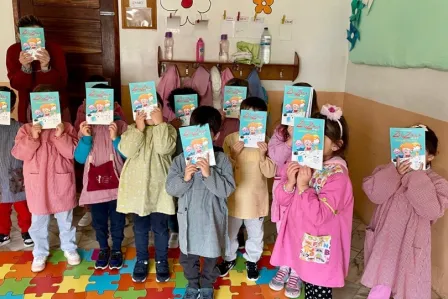As part of the celebrations in Portugal for the 22nd edition of Safer Internet Day (SID), a roadshow focusing on digital citizenship education took place on 12 and 13 February.

On 12 February, the initiative focused on promoting digital literacy from an early age. Two key books were presented: "ZIGZAGA na NET. Navegar a Cores", an interactive colouring book that teaches young children about cyber hygiene in a fun and engaging way, and "Mum, can I use your phone?", a practical guide for parents of children aged 3-6 that provides evidence-based advice on managing screen time and promoting positive digital parenting.
The events took place in six kindergartens, where nine awareness-raising activities were carried out, making a total of 231 children. the sessions were designed to be highly interactive and age-appropriate to ensure that the children actively engaged with the content. A particular highlight was the distribution of 240 books to a school librarian responsible for digital education initiatives in several school libraries within the School Library Network, ensuring that these resources reach a wider educational community. In addition, 600 copies of the book "Mum, can I use your phone?", were delivered in two local health centres in Aveiro, to support families and educators in promoting digital safety outside of school.

On 13 February, the roadshow continued at the Externato de Penafirme in Torres Vedras, where 420 students from the seventh and eighth grades, as well as 200 parents, took part in special sessions on digital citizenship education. The student sessions explored the ten fundamental domains of digital citizenship education, and encouraged the participants to reflect on the benefits and risks of their daily online interactions. The discussions covered key topics such as responsible digital behaviour, the importance of digital wellbeing and self-protection, and understanding their rights and responsibilities online. The session for parents "Digital and young people: are we prepared?" covered critical topics such as recognising real online risks (from cyberbullying to excessive screen time), understanding the impact of digital interactions on children’s mental and physical wellbeing, and implementing practical strategies to keep children safe in the digital world.

A key learning was that the most effective tool for online safety is not an anti-virus programme, but well-informed, engaged parents. The session served as a catalyst for families to rethink their digital habits and reinforced a shared responsibility to promote a safer and more balanced digital environment for younger generations.
With these activities, the Portuguese Safer Internet Centre continues its commitment to empowering communities with knowledge and tools for safer and more responsible digital engagement. This roadshow was not just about raising awareness – it was about inspiring action for a more digitally literate and responsible society.

Find more information about the work of the Portuguese Safer Internet Centre, including its awareness raising, helpline, hotline, and youth participation services, or find similar information for other Safer Internet Centres throughout Europe.
As part of the celebrations in Portugal for the 22nd edition of Safer Internet Day (SID), a roadshow focusing on digital citizenship education took place on 12 and 13 February.

On 12 February, the initiative focused on promoting digital literacy from an early age. Two key books were presented: "ZIGZAGA na NET. Navegar a Cores", an interactive colouring book that teaches young children about cyber hygiene in a fun and engaging way, and "Mum, can I use your phone?", a practical guide for parents of children aged 3-6 that provides evidence-based advice on managing screen time and promoting positive digital parenting.
The events took place in six kindergartens, where nine awareness-raising activities were carried out, making a total of 231 children. the sessions were designed to be highly interactive and age-appropriate to ensure that the children actively engaged with the content. A particular highlight was the distribution of 240 books to a school librarian responsible for digital education initiatives in several school libraries within the School Library Network, ensuring that these resources reach a wider educational community. In addition, 600 copies of the book "Mum, can I use your phone?", were delivered in two local health centres in Aveiro, to support families and educators in promoting digital safety outside of school.

On 13 February, the roadshow continued at the Externato de Penafirme in Torres Vedras, where 420 students from the seventh and eighth grades, as well as 200 parents, took part in special sessions on digital citizenship education. The student sessions explored the ten fundamental domains of digital citizenship education, and encouraged the participants to reflect on the benefits and risks of their daily online interactions. The discussions covered key topics such as responsible digital behaviour, the importance of digital wellbeing and self-protection, and understanding their rights and responsibilities online. The session for parents "Digital and young people: are we prepared?" covered critical topics such as recognising real online risks (from cyberbullying to excessive screen time), understanding the impact of digital interactions on children’s mental and physical wellbeing, and implementing practical strategies to keep children safe in the digital world.

A key learning was that the most effective tool for online safety is not an anti-virus programme, but well-informed, engaged parents. The session served as a catalyst for families to rethink their digital habits and reinforced a shared responsibility to promote a safer and more balanced digital environment for younger generations.
With these activities, the Portuguese Safer Internet Centre continues its commitment to empowering communities with knowledge and tools for safer and more responsible digital engagement. This roadshow was not just about raising awareness – it was about inspiring action for a more digitally literate and responsible society.

Find more information about the work of the Portuguese Safer Internet Centre, including its awareness raising, helpline, hotline, and youth participation services, or find similar information for other Safer Internet Centres throughout Europe.
- digital citizenship digital literacy digital skills media education
Related content
- < Previous article
- Next article >












